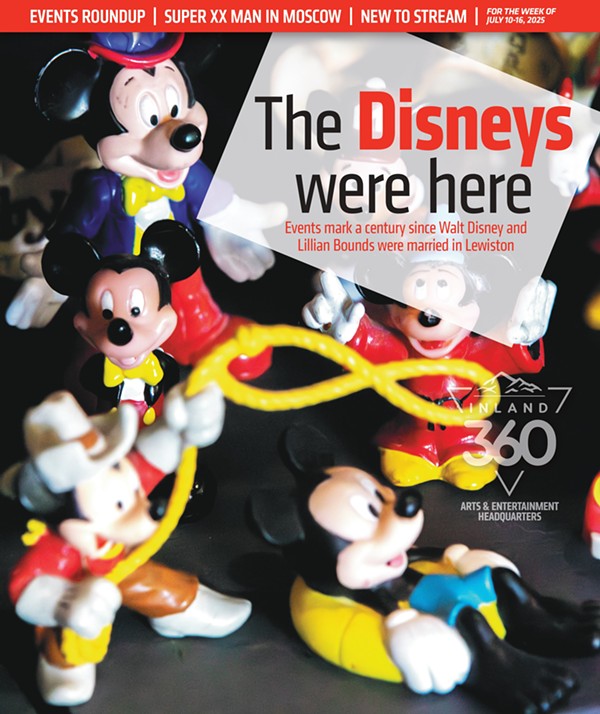MOSCOW -- You’d never know that Sargon Hamad had been born in Iraq unless he told you.
He dresses like any other senior in college, sprinkles casual conversation with an appropriate use of “dude,” demonstrates proficiency with Snapchat filters and doesn’t have an exact plan for what he’s going to “do” with the international relations-political science degree he’s on pace to receive from the University of Idaho next May.
Not even all of his friends know that he came to the U.S. as a refugee from Iraq at the age of 8. He’s one of three local residents who will be sharing their story as refugees at a panel discussion today in Moscow.
Hamad was born in Baghdad in 1994, during the rule of Saddam Hussein. He only remembers fragments of his four years of life in Iraq, partly because of his age and partly because he was prevented from knowing all of it.
“My parents kept me and my brother in the dark a lot of the time -- for good reasons,” Hamad said.
He recalls a time when the family accidentally drove up the long entrance to one of Hussein’s palaces. Hamad’s older brother was ill and they were taking him to see a doctor at a nearby hospital. The guards allowed them to turn around, but not without asking Hamad if he loved “Papa Hussein.” Questioning children was one way the Republican guard would identify who was disloyal to the regime. Hamad responded consistently with the propaganda he’d been fed on government television and the family was allowed to leave.
As the country became an increasingly dangerous place to live, his parents began to seek a way out. But by then, Iraq had begun tightening its borders; too many people, especially skilled professionals, were leaving. Hamad, his brother and mother could leave, but his father -- a petroleum engineer -- could not.
Eventually his father was able to forge documents and offered a bribe that allowed the whole family to escape one night on a bus going to Jordan. They traveled on to Lebanon, where his mother’s family lived. There they applied for refugee status with the United Nations.
It took four years for their status to be approved.
If the process to become a refugee is a long one, being from the Middle East doesn’t speed things up. Hamad’s family had to be cleared by the UN before they were referred to the U.S. embassy as refugee candidates where they went through a separate vetting process.
It was during this time that the Sunni-Shiite conflict reached their neighborhood, Hamad said.
“A lot of people died where we lived,” Hamad said.
It wasn’t until years later that they were able to connect with an old friend who had a business near their home; he is likely still alive only because he had stopped going into work once the violence escalated.
After being accepted as refugees by the U.S., Hamad’s family arrived in Boise in 2003 carrying little more than the clothes on their back. There, they began their transition to life in America. His dad eventually found work on an assembly line. Though he was glad his children had a future, Hamad said, it’s been difficult for him to leave behind a successful career as a petroleum engineer.
Hamad and his brother began learning English when they were living in Lebanon, but knowing English didn’t mean he could communicate easily with American kids.
“That was really hard,” Hamad said. “I didn’t have friends for a long time. I didn’t know how to socialize, I didn’t know what was funny, what was popular. I didn’t know what other kids liked to do that I did.”
He doesn’t remember feeling attacked because of their Iraqi and Muslim background; the pressures to conform were more subtle.
“My mom couldn’t find work for awhile because she wore a hijab,” Hamad said.
Business owners explained to her that they didn’t have a problem with what she wore, but they worried their customers might. She eventually stopped wearing it. She’s been working as a certified nurse assistant for a number of years.
Adapting to life in America took time, but it happened. The person he is now is very different from who he might have been had he remained in Iraq -- a difference he believes is for the better.
IF YOU GO
WHAT: Moscow Racial Equality and Inclusivity Month: Refugee panel discussion
WHEN: 7 p.m. Sept. 14
WHERE: 1912 Center, 412 E. Third St., Moscow
COST: Free
Find out about the likelihood of our area becoming a refugee resettlement community in a related story:
https://inland360.com/top-headlines/2017/09/the-plight-of-flight-moscow-events-to-discuss-refugees-predicament-show-support/




















